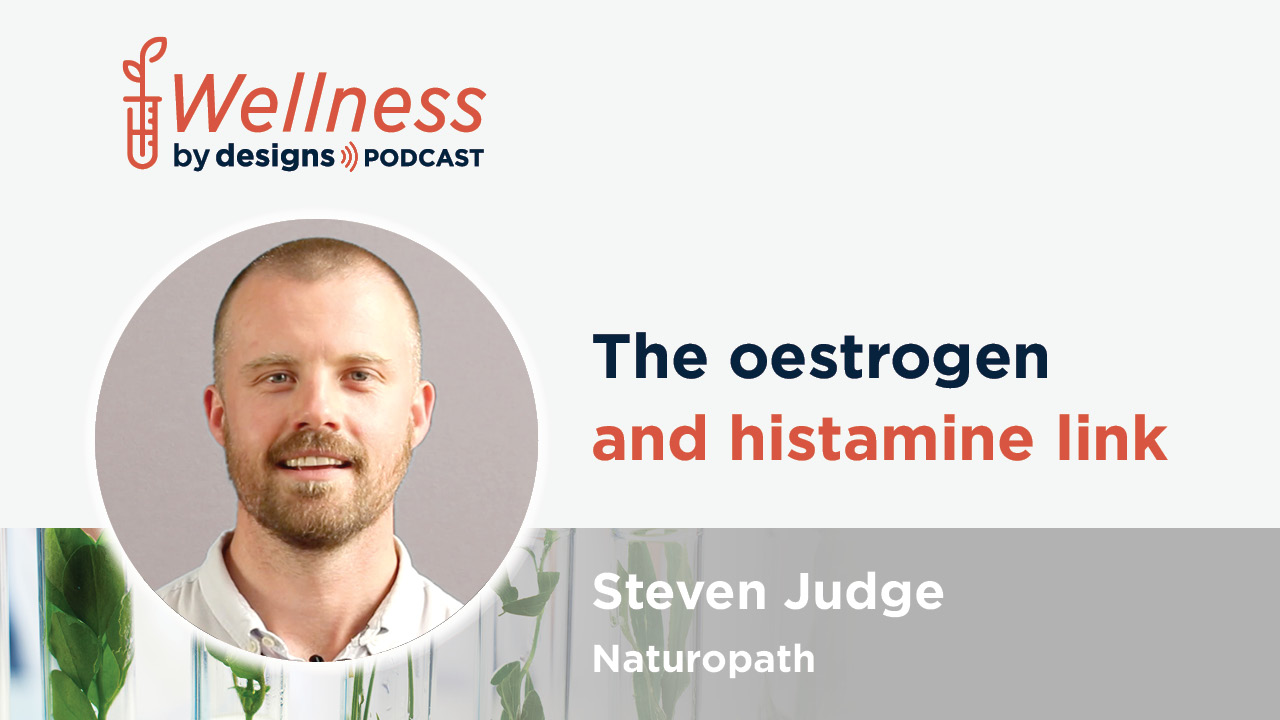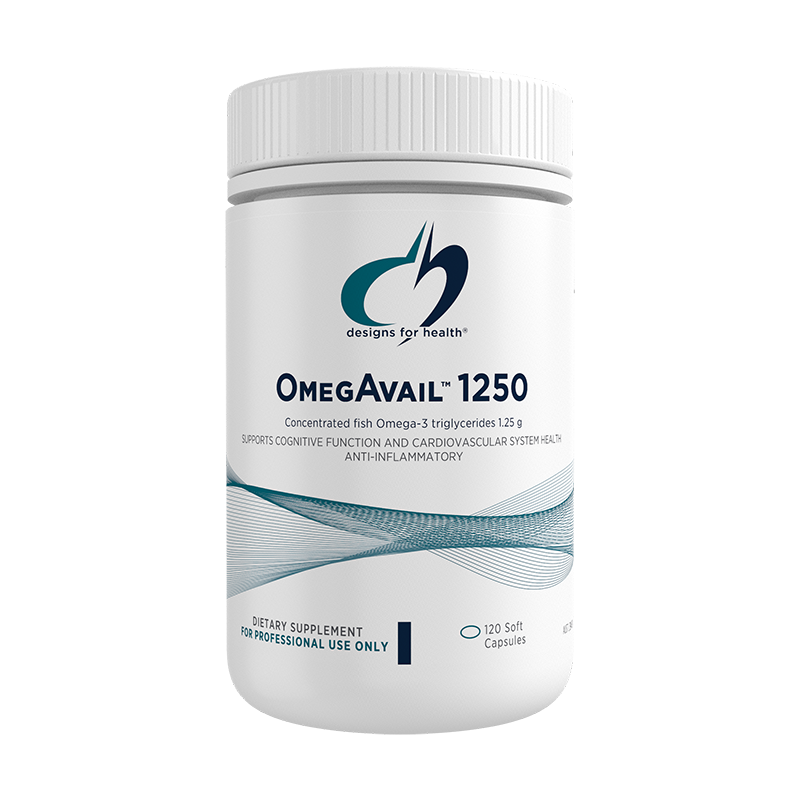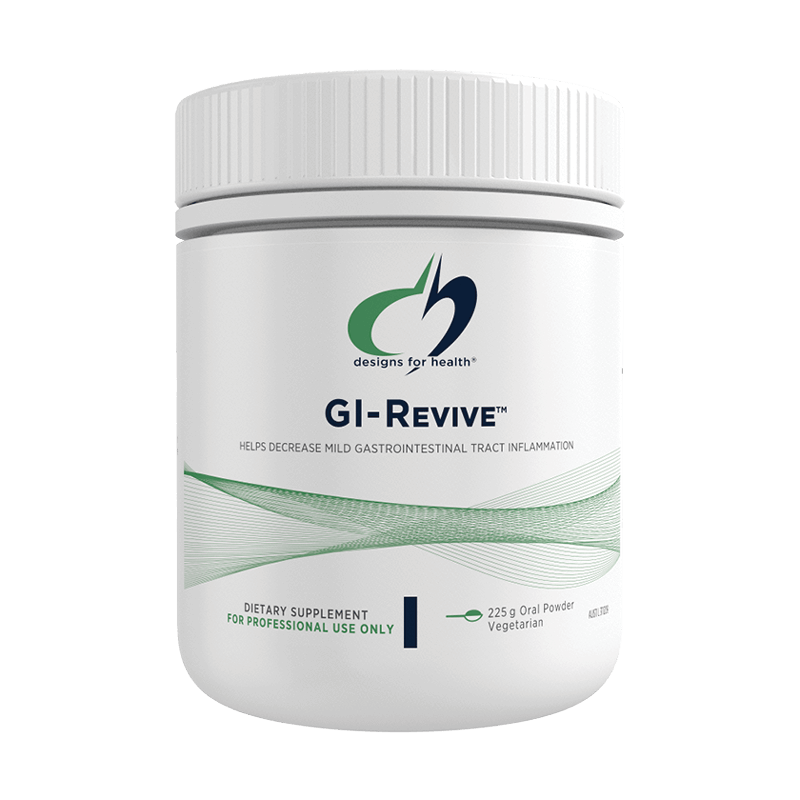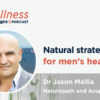

The Oestrogen & Histamine Link
Joining us today is Steven Judge, a naturopath specialising in chronic and complex conditions. Today we’ll be talking about the often misunderstood link between estrogen and histamine.
About Steven Judge:
Steven runs a private practice in Sydney which focuses on helping others to take control of their health and reclaim their power. Whether you’re experiencing digestive disorders such as IBS, anxiety, depression, PCOS, thyroid disorders, autoimmunity, cardiovascular issues – Steven is there to simplify your path to health and wellness by getting to the root cause and treating each person as a unique individual.
Steven works in a kind and respectful way, taking into account the sensitive concerns that people may have with their health. He takes time listening to clients’ histories and evaluating the interactions among genetic, environmental, biochemical, emotional, spiritual and lifestyle factors that influence human health and chronic disease. This holistic assessment approach allows steven to provide integrative and individualised treatment plans so that we can experience true health-care, rather than simply disease management.
Whilst Steven sees a variety of presentations in clinic he has a special interest in chronic digestive disorders & mental health. With depression being one of the leading disabilities worldwide and chronic stress and anxiety plaguing millions of people, now more than ever we need to alleviate the burden of these national health priority areas by treating the whole person and addressing all underlying factors. Since experiencing my own healing through natural medicine I am driven to provide the same opportunity for my clients.
Connect with Steven:
website: www.stevenjudge.com.au
Facebook: stevenjudgenaturopath
Transcript
Introduction
Andrew: This is “Wellness By Designs,” and I’m your host, Andrew Whitfield-Cook. Joining us today is Steven Judge, a naturopath practising in Surry Hills. And today we’ll be speaking about the link between estrogen and histamine. Welcome to “Wellness By Designs.” How are you, Steven?
Steven: Good. Thanks, Andrew.
Andrew: Hey, thanks for joining us today. But first of all, can I ask you a little bit, just take us through a little bit of your story, please?
Steven: Yeah, sure thing. So I ended up in the naturopathic profession just kinda by accident, really. I had zero background in wellness. I did not come from that world. I was not interested in health at all until I started to develop quite a lot of health issues with my gut and my mental health. And, you know, I was pretty young, like in my late teens, early 20s. And, you know, I guess I just kind of visited the conventional medical system for help. And despite me having zero knowledge about health or natural medicine or anything, just what was offered to me, you know, I just intuitively felt like there’s gotta be more I’m offered than that.
And then I did kind of go on a bit of a health journey. I wanted to just get fit and healthy and, you know, my body was a wreck, you know. I was a musician in a previous life, and it’s a very kind of rock and roll lifestyle. But I got into fitness and that kind of naturally sparked my interest in nutrition, very specifically. I was just fascinated by nutritional science. I literally just Googled “nutrition course” and, you know, the Australasian College of Natural Therapies popped up, and I applied and went along, you know. I couldn’t have told you what a naturopath was. But you know, throughout my studies in naturopathic nutrition, I got the bug. I was just so fascinated with what I was learning about.
And I was shocked that what I was learning in college about natural medicine and integrative medicine and kind of root cause, you know, medicine, I was just kind of shocked that I’d never heard of it, and it wasn’t as mainstream as I thought it should be based on how effective it was. Yeah, and so then I just kind of caught the bug and ended up getting into private practice. I love working with people now, one on one. It’s definitely my thing
Andrew: You’re one of this group of searchers, and they’re the smaller group from my observations. Those people that actively search out answers. Like for instance, I fell into nursing, you know. I didn’t have the marks to do physio basically. So there was this sort of passive approach in my story. And I’ve found that most people or many people who enter natural medicine enter it from the medical model fail them or they had health issues themselves, and they were accidentally introduced to natural medicines. But you actively sought it out for health reasons. You didn’t have a knowledge of natural medicine prior to that. That to me is really interesting.
Steven: Not at all. Yeah, not at all. It was all very intuitive, and I had zero interest in, like, “Oh, this is gonna be my career.” Like, it was none of that. I just was following this intuitive whim of wanting to understand, which is very cool, you know, thinking back.
Andrew: And that’s really interesting also that you speak about intuition. It’s interesting how we led to certain things. Can I ask you, though? I wanna delve straight into the topic because it’s a big topic, and I suspect that this isn’t gonna be covered all in one podcast. But anyway, so what are we talking about when we’re talking about the link between estrogen and histamine? Can you take us a little bit about through how your patients present to you?
Steven: Yes. So, you know, I’ve always been interested in gut and mental health. It’s kinda what I like to work with in a clinic. So it caught my attention when I learned that histamine is not only a neurotransmitter, but also a source of like a food intolerance as well. So there were issues with histamine internally and histamine coming into us externally as well. And I didn’t learn much about this at university. So when I discovered this, you know, I was meeting a lot of clients, men and women, but predominantly women who, despite kind of having a good diet and some of them, you know, a good lifestyle, in paper, they were doing all the right things, let’s say, particularly with their diet, you know? Despite that, they were presenting with, like, a broad range of symptoms, which didn’t make sense to me.
So, you know, in the context of estrogen and histamine, and we’ll get into how they’re connected, you know, these women presenting with dysmenorrhea, menorrhagia, a lot of, you know, premenstrual symptoms like clockwork every month, like premenstrual migraines and headaches, and bloating, and fluid retention, and anxiety. And I can’t remember how, but I finally, at some point, stumbled onto this link between symptoms of relative estrogen excess and how a core driver of those is histamine, excess histamine or histamine intolerance.
So, you know, while we know histamine is very commonly associated with being a mediator of allergic reactions, it actually plays many other roles and, you know, it is involved with ovulation and female reproduction. So, you know, essentially, there is this two-way process occurring between estrogen and histamine in the body. They liberate and reinforce each other. So they have the potential to increase the levels of each other, respectively in this vicious cycle, if things get out of hand.
So, what does estrogen have to do with histamine? Well, there are estrogen receptors on mast cells. So, you know, when estrogen binds to those mast cells, histamine is released. But not only does estrogen stimulate histamine release. At the same time, it downregulates the enzyme, the DAO enzyme or diamine oxidase, which is responsible for getting it out of the body. So estrogen increases secretion of histamine, but it also reduces the ability of the body to get it out. So it’s kind of the link there.
And histamine itself stimulates the ovaries to produce more estrogen. So you can end up in this vicious cycle where, you know, there’s high estrogen causing high histamine, and that’s causing high estrogen, and this perpetual liberation continues. So, because of that connection, it’s very likely why women appear to be more susceptible, histamine intolerance. Or maybe people are just not looking for it in men, but clinically I mostly see it in women due to those hormonal sensitivities and fluctuations throughout the menstrual cycle, because a good clue when, you know, histamine intolerance might be at play is that when those symptoms of relative estrogen excess are present, in kind of textbook cases, these occur in women just before ovulation and in that premenstrual phase of the menstrual cycle, because it’s at these times of the cycle when estrogen levels are higher relative to progesterone.
Andrew: Okay. I wanna continue on there because you said a few things that interest me and I really need to learn more about this, but just firstly, you say, you know, mostly women, but also it does present sometimes in men. Would you see these men as being in a higher age bracket? So the sort of, you know, mid 50s, if you like, age bracket of men, or do they indeed present earlier in men?
Steven: They do present earlier, I’ve found. Like young men in their 20s to 30s. In my clinical experience, they’re typically coming in with like chronic reflux, like unresolving, pretty intense, daily heartburn gorged presentation and nausea, and a lot of those gut kinda centric presentations, usually a bit of anxiety in there as well. But yeah, no, I do see quite a wide spectrum of ages.
Andrew: Gotcha.
Steven: Particularly since so many people have gut issues these days, you know?
Andrew: I may as well sort of cover that topic now because it’s in front of us before we go back to women, and that is this picture of reflux, particularly, as you say, in men. You’ve obviously gotta go through when you’re doing a patient intake, you’d have to go through your responsible differential diagnoses there of, you know, potential ulcers, potential Helicobacter pylori infection, pyloric stenosis. I know that’s normally seen in infants. But even with things that might have been picked up, like, you know, esophageal, forgive me, eosinophilic esophagitis. I know that again mainly presents in childhood. But do you have this sort of intake form which teases apart the possible gastrointestinal or other gastrointestinal causes of reflux that may not be due to histamine before going, “Ah, therefore it’s histamine”?
Steven: Yeah, I do. Like, that’s a good point you’re making, this whole, like, histamine intolerance label, because it is really a symptom of a deeper issue, like it’s not a condition itself. Yeah. I do have a pretty comprehensive intake form which, you know, I can get a bit of a picture, and before I see these people, I think, “Oh, you know, they’re looking a bit histamine-y.” I guess, yeah, it’s important to realize it’s the histamine intolerance label. It is really kind of like a diagnosis of exclusion, because people are presenting, like you said, histamine symptoms. It’s like, “Okay, well, they could have Helicobacter pylori. They might have a true allergy. They might have EOE.” Like, it is really kind of, you gotta kind of exclude all that other stuff. I guess what is kind of convenient, in my experience working with people, is, I don’t know, 80% to 90% of people who present with this histamine intolerant picture, they’ve had every investigation under the sun before they’ve seen it.
Andrew: All right.
Steven: Because the histamine intolerance thing is just not looked at in conventional medicine. They’ve been to the immunologist, they’ve been to the gastro, they’ve been to the rheumato, they’ve been to the endocrinologist, and, like, no one’s kinda clocked this phenomenon, which is kinda why I got into it as well. It’s like, “Why isn’t anyone looking at this? It’s really interesting.” But yes, like in my experience, most people have ruled that all out. Or they did have it and they’ve treated it, but you know, something’s still up. Yeah.
Andrew: Right. We’ll talk about Professor Theo Theoharides a little bit later when we talk a little bit further, talking about mast cell activation. But just getting back to women with this, so in the past, you know, we’ve had these quite controversial labels, if you like, or topics of, firstly, there was estrogen dominance, then there was estrogen excess. Now we’re talking about really estrogen sensitivity. Is that right? Or can you actually see an excess of estrogen throughout the woman’s period? Like what are we talking about here?
Steven: Yeah, I guess I do tend to look at it as like a relative estrogen access, personally. Like, I’ve dropped the kind of dominance term, but just relative to progesterone, estrogen being in high quantities. And I guess, you know, in the context of, you know, the whole histamine intolerance issue, it’s a nice concept to explain to patients to keep it simple, because there are progesterone receptors on mass cells as well, you know. So progesterone inhibits a release of histamine. It stabilizes mass cells and upregulates DAO enzyme as well. Yeah, that’s kind of how I frame it and look at it. And, you know, we can get into deeper testing with people, like with all the metabolites and looking at phase one and two metabolites and all that to really confirm it. But to be honest, you know, I guess it’s such a huge focus on the gut with all this that I really have to go there with people. We can get enough info from symptom picture and bloods and kinda gut testing really.
Andrew: Yeah. And you mentioned the medical model previously. And obviously, you know, a medical viewpoint of this would just be, “Oh, well, there’s histamine. Just give an antihistamine. There you go. Problem solved.” Not quite so easy.
Steven: No. I wish it was. No, unfortunately not. But the histamine intolerance situation is like a great example of the difference between a conventional and a naturopathic functional integrative approach. So yeah, conventional medicine is they kinda go, “Cool, too much histamine. Here’s an antihistamine,” whereas, you know, obviously, our approach is really all about asking about the why. So why is this person histamine intolerant? Why are they expressing symptoms of, you know, relative estrogen excess? And what is the connection between histamine and estrogen? And what do we need to do to, you know, resolve these symptoms entirely? Which can be done.
And, you know, it is tricky because the clinical presentation is not only complex, but there’s a variability with the signs and symptoms people might experience, right? I was kinda touching on that before. One person may present, you know, a woman with classic relative estrogen excess symptoms, the painful heavy periods, the PMS, the premenstrual migraines, whereas someone else, male or female, might not have these symptoms, but they might have chronic reflux, and nausea, and anxiety. This is because, like, with this one molecule histamine, there’s four different kinds of receptors in eight different organ systems that it has an influence on. So it can have this staggering level of effects on the body.
And so, you know, I get asked a lot, “Well, where do you start?” Like, you know, how do you help these people? So I guess, regardless of how it is presenting symptom-wise, you know, and I guess let’s bring the focus back to histamine and estrogen, but a core premise of resolving any type of presentation of histamine intolerance and understanding the why, it really comes down to a core philosophy of naturopathic treatment, which is optimal detoxification. It really comes down to that. And I guess, in clinic, I like to frame it to patients… You know, histamine and estrogen, like, they get a bad rap, right, in general, for being the cause of a lot of, you know, issues.
But, you know, the issue isn’t estrogen or histamine, like, inherently. They have jobs to do which are very important. The issue is that we’re just not handling it properly. We’re not getting it out. But I just like to frame it that way because it comes down to perspective, and with patients, how they’re viewing what’s happening in their body. Because they can get kind of stuck with their mindset of “Ah, you know, my hormones and all my histamine” and kind of, you know, intentionally, like they have no control over this situation, but it’s not true. It’s just there are deeper issues going on, and these things are building up and they’re not getting out. And if we can do that, like when meant to, we can restore balance, you know?
Andrew: That being the case though, if you’re concentrating on detoxification, I mean, that’s an old pillar of therapy, if you like, for natural therapies. So we’re talking about digestion, elimination, excretion, all of these sorts of things. Do you concentrate at all on the DAO enzyme and supporting, like for instance, SNPs within that enzyme, or do you act generally with regards to, you know, helping the gut, helping people with their digestion and elimination?
Steven: There is a major focus for me on the gut and this DAO enzyme component. Yeah, because basically, you know, like I said, it’s a symptom of a deeper issue. There’s poor detoxification. There’s two main channels to get histamine out. The first is like this endogenous histamine we create ourselves, which is via the HNMT enzyme, which degrades histamine via SAM-e. So, you know, endogenous histamine detoxification is really, like, we need to look at methylation and function, okay? But then we have the exogenous histamine coming in from outside the body, and that is detoxified via the DAO enzyme, which is found in many different organs, but predominantly the gut. It’s very highly concentrated in the epithelial lining of the gut. And, you know, DAO enzyme production can be directly affected essentially by gut dysbiosis, small intestinal bacterial overgrowth, and intestinal hyperpermeability.
So, you know, the genes are interesting. I don’t have a huge focus on them, you know, I guess because, you know, another question I get asked is, “Well, how can we test for histamine intolerance?” It’s like there are many tests you can look at to kinda confirm, like, why someone has been so susceptible to this. So someone may have the genetic SNPs, for example, but that doesn’t mean they’re going to be riddled with histamine intolerance for the rest of their life. Like we know, it’s really about everything around us in the environment.
So in this context, the environment, and the environmental piece of the puzzle here that’s really important is the state of the gut, and is there a dysbiotic situation? Because a dysbiotic gut, certain bacterial species in that situation produce more histamine. So there is a huge focus on the gut. It’s pretty rare, like, you know, the central nervous system, histamine production, and the mental health presentation of too much histamine. It is technically like a separate phenomenon to, you know, histamine issues with the gut and the DAO enzyme, but it’s pretty rare that these things are happening in isolation.
Andrew: Gotcha.
Steven: But yeah, the massive focus on the gut, it’s really…because when people ask me, “Where the hell do you start here?” You know.
Andrew: That’s my next question.
Steven: You’ve gotta start with the gut. Yeah. Yeah. So you have to start with the gut.
Andrew: Okay, well, let’s address that then. LIke, when we’re talking about particulars, obviously we can’t talk brand names, but what sort of ingredients do you find of merit? Where do you start? Do you start at, you know, just simple eating and chewing habits, stress at mealtimes, that sort of thing, or do you go more heavy-handed and get them onto, like detox, protein supplements, things like that?
Steven: My approach with these people is it’s not heavy-handed, but I do like to get testing underway straight away. I say to people, “Look, there’s all these tests you could do, and your hormones are out of balance,” whatever, but like, “First, can we just get some proper blood work done?” You know. “And then while you go away and follow a low histamine diet for me for two to four weeks, we’ll go get some microbiome, you know, genetic analysis done so we can treat the root cause of this properly.”
Yeah. So I know there’s hangups in the, you know, naturopathic functional community about “Well, the low histamine diet isn’t a solution, and you know, that’s just symptom relief.” And it’s like I get that, but these people, the people I see anyway, are pretty sick. I’m talking like, you know, three migraines a week and chronic reflux. So that intervention, like following a low histamine diet to begin with for these people is very effective. Like, they come back similar with the FODMAP. People come back and go, “Whoa,” like, you know, “I’m 90% better.” And it’s like, “Cool.” That is really how to figure out if someone’s histamine intolerant. Just follow the diet and see how you feel. It should be pretty obvious in a few weeks.
Andrew: So a low salicylate diet followed for a few weeks and you basically get at least some sort of confirmation of there’s an issue here, at least with exogenous salicylates. Then you’ve gotta think about elimination then. So, you know, what do you employ there? Or are we talking about general bile flow and high fibers to prevent enterohepatic recirculation of mainly hormones, but other things as well? What do you employ there?
Steven: Yeah. Personally, I start very low and slow with these people. They’re very sensitive. So while we’re getting to do like a low histamine diet and we’re waiting on testing, I’m pretty much just getting some nutrients into them to help with bowel movement regulation and liver support, like some pretty basic things. Magnesium, zinc, some activated B vitamins if I think they will tolerate it. Certain people, depending on their presentation, I won’t go there. And just some very gentle pre-, probiotic treatments, just to start that process of starting to restore the environment and get their bowels moving properly. A lot of these people, their bowel movements are very irregular. But it’s pretty gentle, my approach.
But then once we get microbiome or SIBO results back, then, hopefully after a month or two of building them up and getting some relief and, you know, addressing some nutrient deficiencies on blood tests, if that’s relevant, then we will get into a bit more… I don’t wanna say hardcore, like stronger treatment, like really treating the dysbiosis or bacterial overgrowths or pathogens if they’re there. And that process can take a while, you know, at least two to three months, that first stage of dealing with dysbiosis and SIBO. But yeah, it’s very low and slow for me to begin with. And I’m just trying to build these people up because they’ve got, you know, pretty intense degrees of malabsorption and so they’re really tired, you know. So I’m just kinda get the gut liver moving very gently, but also just start the process of restoring their nervous system, actually. Yeah.
Andrew: Uh-huh. You mentioned SAM-e previously. You’ve also mentioned methylation. I’ve spoken with Carolyn Ledowski about this, and I am turning… That came out wrong. But I was one of these old school people that just, you know, pushed through with folic acid dental work. I’m now of the mind that this important work that Carolyn Ledowski is doing about unmetabolized folic acid, is that contributing to the histamine picture or the histamine sensitivity picture, and is that one of the reasons you used activated B vitamins, including the methylfolate? And, you know, like, can you take us through SAM-e and what effect it has, that sort of stuff?
Steven: Yeah. The unmetabolized folic acid issue could definitely be involved with it, you know, because, like I was saying before, methylation is a key process for the detoxification of intracellular histamine. What was the second part of that question you asked?
Andrew: SAM-e.
Steven: Ah, SAM-e. Yeah, look. Yes, the unmetabolized folic acid will definitely be contributing to this in a lot of people, particularly if they are presenting with central nervous system presentations of, you know, excessive histamine. SAM-e, oh, like, I rarely prescribe it, to be honest.
Andrew: Right. Gotcha.
Steven: At the beginning of treatment, like even the activated Bs, some people, like, it really depends on how they’re presenting to me, you know. If they are severely anxious and have multiple chemical sensitivities, and more complex presentations like MCAS,, I’m not putting them on anything methylation, any kind of methylated nutrient, definitely not SAM-e. I have before when, like, you know, I got a bit excited when I discovered all this, and, you know, it really just ramped up these pathways way too quickly and people typically have side effects.
I will, based on blood tests, put people on B12, definitely. It kind of bypasses the gut and having to deal with that. Get that process started of kind of, you know, trying to improve methylation status. But that’s about it. Otherwise, I’m really just looking at, you know, the building blocks of trying to get their methylation cycle working gently. So you have the zinc and the B12 and the mag, and maybe an activated B supplement along the way, if I think they can handle that.
Andrew: Gotcha. What about things like amino acids to help support the detoxification process? So things like, for instance, somebody who’s really sensitive, glycine, do you ever use that? Or do you ever use glutathione or…?
Steven: I do use glycine quite a lot. Liposomal glutathione, I have used in many cases with this estrogen histamine presentation alongside, you know, calcium D-glucarate. Sorry, they’re not technically an amino acid. But just to kind of start liberating these detoxification pathways, yeah, glutathione I will use with a lot of people, and glycine. I’m kinda using glycine more because no one’s sleeping. Like, it’s quite an effective treatment for that. But with the liver detoxication pathway, for sure. But the calcium D-glucarate is pretty useful in these situations because we know that glucuronidation is a really important phase to liver detoxification pathway for detoxifying estrogen amongst other things.
And what can happen with these excess estrogen histamine presentations is once the liver deposits you know, let’s say estrogen into the lumen after going through phase two glucuronidation, it should be removed from the body via the bowels, but glucoronidation can get reversed by an enzyme in the gut called beta-glucuronidase, which I really like to see on microbiome testing as part of this treatment, because beta-glucuronidase, it’s basically an enzyme produced by bacteria in the gut, and in large quantities, it allows for the recirculation of estrogen. So it kind of undoes what phase one and two liver detoxification just try to achieve.
Andrew: So with regards to using calcium D-glucarate in aiding glucuronidation, and then having it undone by bacteria that secrete glucuronidase, do you, therefore, have to focus first, equally, whatever, at the same time, by using certain probiotics or prebiotics that help favor those bugs that don’t produce glucuronidase, or at least might help to push them out, if you like, or hamper their production?
Steven: Yeah. Yeah. It’s a good point. Because calcium D-glucarate, you know, it inhibits the activity of the enzyme, but it doesn’t actually lower it, you know. So I love seeing beta-glucuronidase because I can, on a microbiome test, say to people, “Look, this is a definite link with you not getting rid of estrogen properly. Take this. It’ll help you do that.” But this is also a symptom of a deeper issue, the high beta-glucuronidase. It is a symptom of dysbiosis patterns. So yeah, you know, that’s why at the beginning of treatment, I am getting some very gentle pre-, probiotics. Maybe not a very kind of SIBO-looking person, probiotics. But I am definitely looking at, like, dysbiosis patterns on microbiome testing, and looking to balance out certain commensal bacteria, because the beta-glucuronidase is interestingly produced by certain bacteria, so like E. coli, certain Clostridium species. Yeah.
Andrew: Cool. And so what about herbs? And forgive me, other nutrients. So we’re talking about, you know, the bile triad, the production of bile, when we’re talking about decreasing the cholesterol, increasing the bile acids, increasing the…lesser than, I think it is, with choline. Do you employ things like choline, and taurine, and, you know, vitamin E? We are now favoring the tocotrienols over the tocopherols. Do you ever employ those in these things, or do you use herbs, which might help the bile flow?
Steven: Yeah, look, I do use herbs for bile flow, like choleretic herbs. These days, I’m cautious doing that at the very beginning until I’ve got testing results just because of the whole… And if people have SIBO and there’s bile deconjugation, or there’s sulfate-reducing bacteria in the gut test, I will use those as long as there’s nothing going on there. So I will use those, but I’ll wait. First up, some things I may use, like I was saying, for glutathione, I will look at, like, broccoli sprout as well. Just pretty gentle. They’re the main ones. Vitamin E, yes. I actually am prescribing vitamin E a lot more nowadays. It’s kind of very overlooked in its anti-inflam action and helping to regulate, like, zinc-copper balance in the body and stuff like that.
Andrew: That’s a whole story in itself, the whole vitamin E thing, isn’t it? We’ve gone from vitamin E and then there was an issue about using synthetic vitamin E and favoring the alpha-tocopherol, then it was the gamma-tocopherol. Now it’s the tocotrienols which we are seeing come out in the research as having particularly advantages over metabolic issues. I wait with bated breath to see if further research shows anti-inflammatory actions. That will be very interesting.
Steven: Yeah, definitely, definitely. And I also use…a very gentle and very cost-effective intervention is glucomannan to start helping with the clearance of estrogen and of bilirubin. You know, there’s a really interesting paper in the British Journal of Nutrition that showed glucomannan significantly decreased fecal beta-glucuronidase activity. So that was a neat little study that Rachel Arthur got me onto. So yeah, glucomannan is also quite…it’s a very gentle kind of prebiotic. It helps increase Bifidobacterium, and yeah, it has some quite nice actions in the gut as well. So I do like to…I’m bringing that in a lot more for people these days.
Andrew: Excellent. And so, you know, obviously, many of these women particularly are on concurrent medications, not the least of which would be the oral contraceptive pill. How do you work around, say, potential medical interactions, or even, can I say, you know, you’ve got chronic reflux, so they’re put onto just a PPI, which is gonna worsen the whole digestive detoxification issue, but it relieves the symptom very well. Great medication. The perfect medicine is one that relieves the symptoms while furthering the… Sorry?
Steven: I was gonna say, you know, “Doesn’t the insert say these meds are meant to be prescribed for two weeks or something?” PPI?
Andrew: Yeah. Six weeks was the original.
Steven: Wow. I mean, I think people are less
Andrew: So how do you work around medicine interactions?
Steven: Yeah, it’s a good question. You know, there are actually so many medications that either inhibit DAO enzyme or directly stimulate histamine release. Because I work with mental health a lot, I do see a lot of people on psychiatric meds. And there’s a huge list of psychiatric meds which influence histamine, like antipsychotics, SSRIs, SNRIs. Like, a lot of them do. And some of them also kind of can cause low histamine issues, actually, depending on the drug. But, you know, in the context of, say, I guess, because I see a lot of people on psychiatric medications and their kinda long-term goal is to get off those, you know, I’m never suggesting…I’m kind of encouraging people to, like, “Let’s prepare you for that journey.” There’s a lot of, again, I say, “Look, we just need to make sure your detoxification capacity for histamine is as optimal as possible before you even go there.”
And obviously, as well as addressing all the aspects of their life that could be contributing to dysbiosis and poor histamine and whatever, like diet and their environment, if they’re surrounded by molds, like you’ve gotta look at all this stuff. But yeah, there’s other meds, like NSAIDs affect histamine release, and other analgesics, and Metformin and antihypertensives,. It’s a huge list. I guess I just keep it simple with people. I just say, “Look, like, whatever med you’re on, let’s just prepare you to come off when you want to do that, but give it some time. We really need to make sure that all the environmental factors have been looked at and addressed for what’s relevant for you. We will look at the gut. We will sort out that gut and look at the diet, lifestyle, things that are associated with improving that. And if it’s irrelevant, like with the hormonal factor with estrogen, we’ll make sure your detoxification capacity for that is improved and ready to handle coming off.”
And especially with the oral contraceptive pill, that’s a big one. You know, especially if there is a synthetic estrogen, you know, that can be a big driver of certain symptoms, like histamine presenting symptoms in women. But again, I’m saying, “Give it two to three months before coming off that.”
Andrew: I have to ask, how do you handle, from a medical-legal point of view, bringing these patients off, what can be quite, you know, chunky medications, quite hard-hitting medications, antipsychotics and other medications that can have an impact either quickly, severely, and not just for their own health, but potentially the health of others? How do you work that one? That’s a fine line.
Steven: Yeah, it is. No, just to clarify, you know, when I meet these people, it’s interesting, actually. A lot of clients coming through are kinda telling me they’re about to do this and they haven’t told their psychiatrist or their GP. So I remember going, “Hold on a sec. Like, we need to prepare you for this, but I need you to tell your specialist or GP that you are considering this for yourself and you need to do this. And it has to be monitored by them very closely.” Especially psychiatric medication. Okay? And yeah, you know, I think some people are just in a really desperate situation, and they’re like, “Stuff this. I’m coming off that, and that’s why I’m here to see you.” And I’m kinda going, “Hold on. Like, we need to prepare you for this. And it could take at least two to three months before I would even suggest, under the guidance of your physician, beginning that process.” Yeah.
Andrew: Yeah. You know, I actually wonder. This is such a big topic when you really look into it. You lift the lid off, you think, “Oh, yeah, it’s just gonna be one thing.”
Steve: I know.
Andrew: There’s a whole quagmire of other issues beneath this, but one of them might be, is this part of the reason why, you know, there’s only a 50% chance of an antidepressant working in any patient, of the first antidepressant attempted? Could this be at least part of the answer? I mean, I have no answer. It’s just a question. But Steven, where can we find out more? Do you have any, you know, patient references, practitioner references? Do you mentor people on this?
Steven: Yeah, look, I have, like, a blog or two on my website. I wish I had something more comprehensive. It’s in the works. It’s a bit so busy. But a few people who beat me to the punch, Joanne Kennedy, who you would know, has a pretty awesome resource for histamine intolerance, like methylation guru woman. She has some amazing stuff, as does Rachel Arthur. A bit more practitioner-centric, that kind of info she’s got, like it’s more nerd on histamine. And, you know, for the layperson and, like, patients, Lara Briden has some very core resources on this, very to the point and practical. And yeah, if people want to go more, I’d definitely head the way of those practitioners.
Andrew: I mentioned at the very beginning of our podcast, Professor Theo Theoharidies. And yes, that’s the name. And up on YouTube, he’s got a couple of very instructive videos, which are largely targeted at neurodevelopmental disorders, but it’s so interesting, his methodical way of saying, “Well, okay, we think we might just jump to this, but no, we have to do this first to confirm that we have that.” He was enlightening to me and quite instructive. But, like, I just thank you for taking us through what is obviously such a quagmire. You’ve obviously got some experience in caring for people with this and helping them navigate these avenues. So thank you so much for joining us today on “Wellness By Designs,” Steven Judge.
Steven: Yeah. Pleasure. Thanks, Andrew.
Andrew: This is “Wellness By Designs.” I’m Andrew Whitfield-Cook. And remember that you can catch up on all of the other show notes and the other podcasts on the Designs For Health Website. Thanks for joining us today.








 Essential Insights into Gallbladder Function and Care with Amie Skilton
Essential Insights into Gallbladder Function and Care with Amie Skilton Natural Strategies for Men’s Health with Naturopath Jason Mallia
Natural Strategies for Men’s Health with Naturopath Jason Mallia Exploring Extemporaneous Compounding with Diana Boot
Exploring Extemporaneous Compounding with Diana Boot